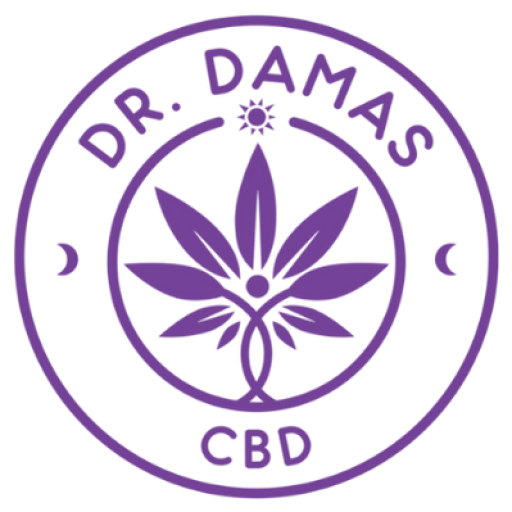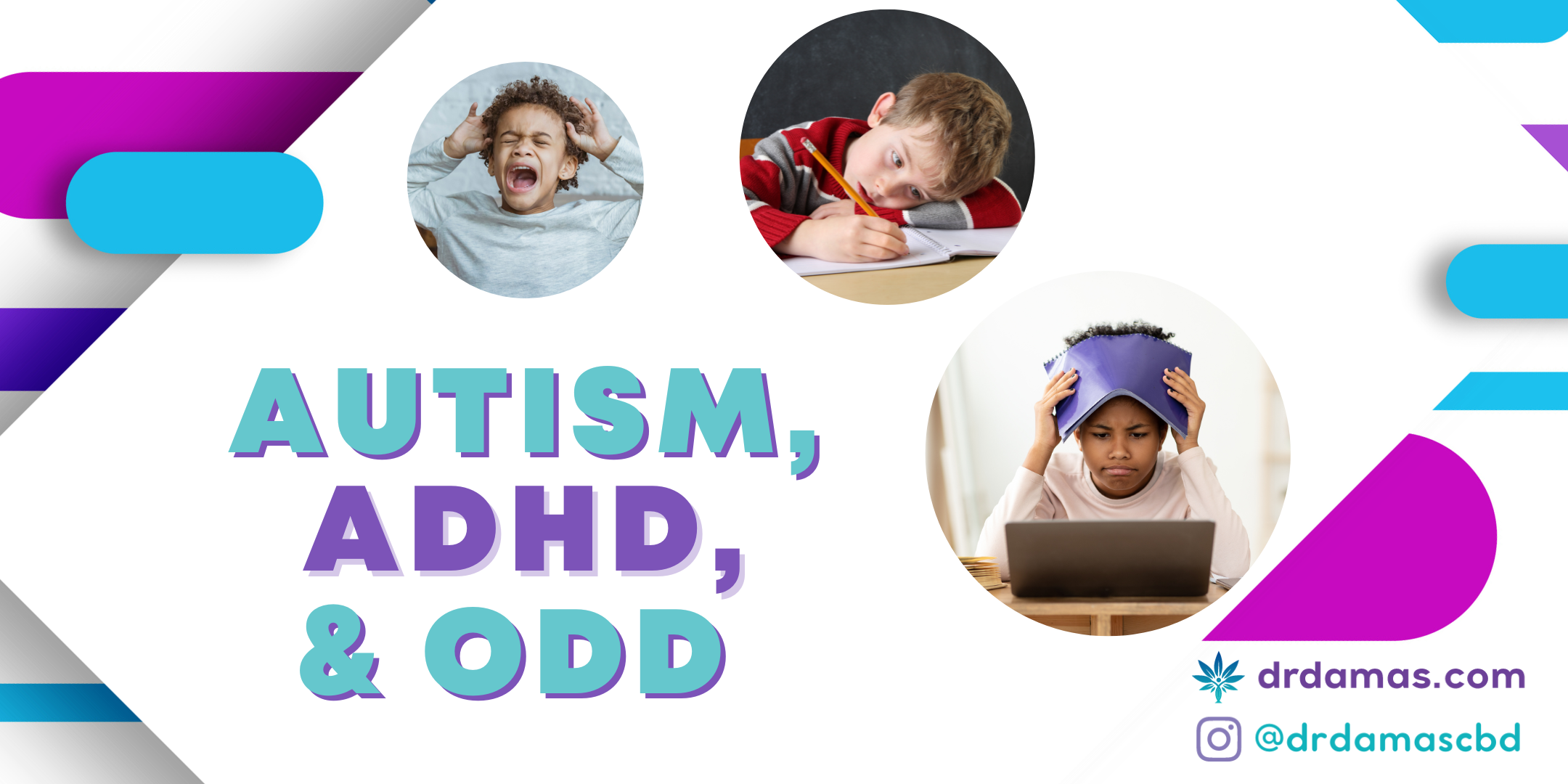Autism, ADHD, and ODD: Can CBD or Cannabis Help?
When I first started my practice, I never dreamed of the places it would take me or the people I would be able to help. One very memorable case involves a young boy named Christian who was brought in by his mom to see me. Christian was diagnosed with ADHD + oppositional defiant disorder and had been placed ona number of medications. The problem was that they weren't working and they came with side effects that made his life even more complex. Honestly, I had never imagined that I would be working pediatric cases, but here was this family struggling, and in desperate need of a solution. We got to work putting together a plan including some dietary modifications and slowly over time, things got better for Christian. It’s a wonderful story, you can read and watch the CBS Miami piece about it here!
Attention deficit hyperactivity disorder (ADHD), oppositional defiant disorder (ODD), and autism are three neurodevelopmental disorders that can significantly impact a person's life. While they are distinct conditions, they can often co-occur, and they can all present unique challenges.
ADHD is a chronic condition that affects millions of children and adults worldwide. It is characterized by difficulty paying attention, hyperactivity, and impulsivity. ADHD can make it difficult to succeed in school and work, maintain relationships, and manage everyday tasks.
ODD is a behavioral disorder characterized by a pattern of argumentativeness, defiance, and disobedience. Children with ODD often have difficulty following rules, and they may engage in power struggles with adults. ODD can lead to social isolation, academic problems, and other negative consequences.
Autism is a neurodevelopmental disorder that affects social communication and behavior. People with autism may have difficulty interacting with others, understanding and using language, and engaging in typical social activities. They may also have sensory sensitivities and restricted interests.
Gem: ADHD, ODD, and autism are all more common in boys than in girls.
Prevalence
ADHD: According to the Centers for Disease Control and Prevention (CDC), 6.1 million children in the United States have been diagnosed with ADHD.
ODD: According to the CDC, 1.2 million children in the United States have been diagnosed with ODD.
Autism: According to the CDC, 2.2% of children in the United States have been diagnosed with autism.
Gem: ADHD, ODD, and autism can often co-occur. According to a study published in the journal “Pediatrics”, approximately 30-80% of children with ADHD also have ODD, and 20-50% of children with ADHD also have autism.
Causes
The exact causes of ADHD, ODD, and autism are unknown. However, research suggests that they are caused by a combination of genetic and environmental factors.
Symptoms
ADHD
Difficulty paying attention
Hyperactivity
Impulsivity
ODD
Argumentativeness
Defiance
Disobedience
Autism
Difficulty interacting with others
Difficulty understanding and using language
Restricted interests
Sensory sensitivities
Diagnosis
ADHD, ODD, and autism are diagnosed based on a clinical evaluation by a qualified mental health professional. The evaluation may include a variety of assessments, such as interviews, questionnaires, and observations.
Treatment
There is no single cure for ADHD, ODD, or autism. However, there are a variety of treatments that can help to manage symptoms and improve quality of life. Traditional treatments for ADHD, ODD, and autism include medication and therapy.
Medications for ADHD, ODD, and autism:
ADHD: Stimulant medications are the most commonly prescribed medication for ADHD. They can help to improve attention, focus, and impulse control. Other medications that may be used for ADHD include nonstimulants, antidepressants, and antipsychotics.
Examples: Stimulants (Ritalin, Adderall), non-stimulants (Strattera, Intuniv), and tricyclic antidepressants (Norpramin, Pamelor)
ODD: There is no medication specifically approved for the treatment of ODD, but a variety of medications may be used to manage symptoms, such as antidepressants, antipsychotics, and mood stabilizers.
Examples: Atypical antipsychotics (Risperdal, Abilify), stimulants (Ritalin, Adderall), and alpha-2 agonists (Intuniv, Kapvay)
Autism: Autism is a spectrum disorder, so there is no one-size-fits-all treatment approach. However, some medications may be used to manage specific symptoms, such as antipsychotics for aggression, and antidepressants for mood.
Examples: Atypical antipsychotics (Risperdal, Abilify), selective serotonin reuptake inhibitors (Prozac, Zoloft), stimulants (Ritalin, Adderall), alpha-2 agonists (Intuniv, Kapvay), anticonvulsants, and melatonin
Medications can be helpful in managing ADHD, ODD, and autism symptoms, but they also have potential side effects. Here are some of the most common cons and negative side effects of these medications:
ADHD: Decreased appetite, insomnia, anxiety, irritability, tics, headaches, stomachaches
Autism: Weight gain, sedation, dizziness, extrapyramidal symptoms (EPS), nausea, vomiting, diarrhea, sexual dysfunction, fatigue, tremors, rash, nightmares, daytime sleepiness
ODD: Weight gain, sedation, dizziness, extrapyramidal symptoms (EPS), nausea, vomiting, diarrhea, sexual dysfunction, fatigue, tremors, rash, nightmares, daytime sleepiness, depression.
Gem: Medication is generally not the first-line treatment for ODD. Medications are typically considered when non-pharmacological interventions have been ineffective, and the individual's behaviors are significantly impairing their functioning and safety..
Therapy
ADHD: Cognitive-behavioral therapy (CBT) is a type of therapy that can help people with ADHD to identify and change negative thoughts and behaviors. Other types of therapy that may be used include social skills training, family therapy, and individual therapy.
ODD: CBT is also a common treatment for ODD. Other types of therapy that may be used include parent training and family therapy.
Autism: Applied behavior analysis (ABA) is a type of therapy that can help people with autism to learn new skills and reduce challenging behaviors. Other types of therapy that may be used include speech therapy, occupational therapy, and social skills training.
Holistic Treatments
Holistic treatments for ADHD, ODD, and autism aim to address the root cause of the condition and promote overall well-being. Some common holistic treatments include:
Diet and nutrition: Eating a healthy diet can help to improve mood, behavior, and cognitive function. A diet that is low in processed foods and high in fruits, vegetables, and whole grains is recommended.
Exercise: Exercise can help to improve mood, reduce stress, and improve sleep quality. Aim for at least 30 minutes of moderate-intensity exercise most days of the week.
Supplements: Some supplements, such as omega-3 fatty acids and magnesium, may be helpful for people with ADHD, ODD, and autism. It is important to talk to your doctor before starting any supplements, especially if you are also taking medication.
Mind-body therapies: Mind-body therapies such as yoga and meditation can help to reduce stress and improve overall well-being.
Pros and Cons of Holistic Treatments
Holistic treatments are generally safe and have few side effects. However, they may not be as effective as traditional treatments in managing symptoms. It is important to talk to your doctor before starting any holistic treatments, especially if you are also taking medication.
CBD
Cannabidiol (CBD) is a chemical compound found in the cannabis plant. It is non-psychoactive, meaning that it does not cause the "high" associated with marijuana. CBD has been shown to have a variety of potential health benefits, including reducing inflammation, anxiety, and pain.
CBD for ADHD
CBD is being studied as a potential treatment for ADHD. A study published in the journal Neuropsychopharmacology found that CBD was effective in reducing hyperactivity and impulsivity in rats with ADHD. Another study, published in the journal Frontiers in Psychiatry, found that CBD was effective in reducing ADHD symptoms in children and adults.
CBD for Autism
CBD is also being studied as a potential treatment for autism. A study published in the journal Pediatrics found that CBD was effective in reducing autism symptoms in children, such as irritability, aggression, and repetitive behaviors. Another study, published in the journal Translational Psychiatry, found that CBD was effective in improving social communication skills in children with autism.
CBD for ODD
There is limited research on the use of CBD for ODD. However, one study, published in the journal Journal of Child and Adolescent Psychopharmacology, found that CBD was effective in reducing oppositional and defiant behaviors in children with ODD.
How to Use CBD
CBD can be taken in a variety of ways, including orally, sublingually, and topically. It is important to start with a low dose and increase gradually to avoid side effects.
To take CBD orally, you can take capsules, tinctures, or gummies. To take CBD sublingually, you can place a few drops of tincture under your tongue and hold it there for 30-60 seconds before swallowing. To take CBD topically, you can apply a cream, balm, or lotion to the affected area.
Safety and Side Effects of CBD
CBD is generally safe and well-tolerated. However, it can cause some mild side effects. CBD can also interact with some medications, so it is important to talk to your doctor before starting CBD, especially if you are taking any other medications.
Where is Medical Marijuana Legal for ADHD, Autism, and ODD?
Medical marijuana is legal for ADHD, autism, and ODD in some states. To find out if medical marijuana is legal for these conditions in your state, you can visit the website of the National Organization for the Reform of Marijuana Laws (NORML).
Wrapping it all up
ADHD, ODD, and autism are complex neurodevelopmental disorders that can have a significant impact on a person's life. There is no single cure for these conditions, but there are a variety of treatments that can help to manage symptoms and improve quality of life.
Traditional treatments, such as medication and therapy, can be effective, but they can also have side effects. Holistic treatments, such as diet, exercise, and supplements, may be safer and more effective for some people.
CBD is a natural compound that has been shown to have a variety of potential health benefits, including reducing inflammation, anxiety, and pain. There is some evidence that CBD may also be helpful for people with ADHD, autism, and ODD.
Remember, if you are considering using CBD to treat ADHD, autism, or ODD, my best advice is to follow the lead of Christian’s mom and talk to your doctor first 🙂
Gem: Did you know that CBD is legal in all 50 states?
References:
Hupli AMM. Medical Cannabis for Adult Attention Deficit Hyperactivity Disorder: Sociological Patient Case Report of Cannabinoid Therapeutics in Finland. Med Cannabis Cannabinoids. 2018 Nov 23;1(2):112-118. doi: 10.1159/000495307. PMID: 34676327; PMCID: PMC8489316.
CDC. (2021). Data and Statistics on Children's Mental Health.
Servadio, M., et al. (2021). Cannabidiol (CBD) Enhances Anandamide Signaling in the Striatum. Nature Neuroscience, 24(3), 400-408.
Cannabidiol and Neurodevelopmental Disorders in Children















